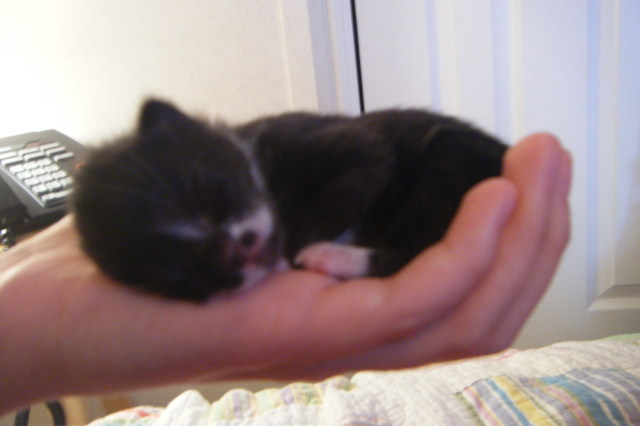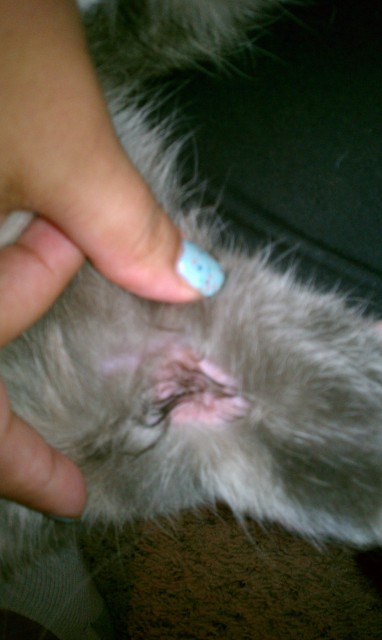QuestionWe have three indoor-only cats. They have never gotten outside. All have been spayed/neutered and are current in their shots. We just found a long worm in one of their stools. (We don't know which as they all share two litter boxes ).
I am wondering where the worms could have come from. I've read on this site that flea bites can transmit worms, but I've never seen a flea on any of them. I'm sure I would have noticed, as all three get semi-daily brushings. Do you know of another potential source?
AnswerHi William,
If the worm you found was long, it would not be evidence of a tapeworm, the kind of worm transmitted by fleas. Tapeworms release small segments the size of a grain of rice. This is a relief, since fleas can be a real pain to get rid of!
What you have probably found is a roundworm. This is the most common worm found in cats. An adult roundworm is typically about 3-4" in length and resembles spaghetti (when alive and outside of stool). The vast majority of cats are infected with roundworms as kittens, even those who have never been outdoors, since roundworm larvae can pass through mom's breast milk. Unlike tapeworms, which release noticeable egg sacs through the anus that are found in the cat's bedding and around the house, roundworm eggs are microscopic. Most owners are completely unaware that their cats are infected unless the infestation becomes extremely severe and the cat vomits up the worms. Your cats may have been carrying the parasites since kittenhood, or it's possible that you could have brought eggs in on your shoes from the soil. Roundworm eggs are infective in a favorable enivronment for 2 years, or possibly longer! In the odd case, if a mouse got into the home and one of the cats caught and ate it, this can be a source of infection. So tracing the source of infection is impossible. Fortunately, the infection is treatable.
The best treatments will come from your vet. One treatment, Revolution, is a topical medication that also protects against fleas, ticks, ear mites, hookworms and heartworms. There is also a topical dewormer called Profender that would kill other types of worms including tapeworms and hookworms, in case your cats have either of those. Finally, oral medications like Strongid or Drontal could be given. The downsides of these are that cats are typically difficult to medicate, and the treatments must be repeated. However, they are effective very quickly. Your cats will have needed to see the vet at some point in the past for the vet's office to dispense the Revolution, but a visit isn't usually needed. The other two usually require a vet visit. There are some roundworm treatments available at pet stores that don't have a fantastic safety record and are not very effective, but you could try them at your own risk.
To be sure you get rid of the pests, treat all three cats at the same time, and be sure to keep your litter boxes clean. Roundworm eggs are passed in the stool and only become infective once they have been in the environment for at least 48 hours. As long as you scoop feces from the box at least once a day, reinfection should not be a concern. Because it's possible that the cats may have tracked eggs outside the box, you should also vacuum well and bleach hard floors where possible, after treatment has commenced.
Sometimes roundworms will show up even after treatment, say if roundworm eggs are dragged in from the outdoors again. Treatment can be repeated every couple of months if necessary, or you can keep the cats on Revolution year-round to prevent roundworm infection altogether.
Good luck!
Jessica

 vacation house and taking cat
Questionour permanent home is on a 3 acre semi wooded p
vacation house and taking cat
Questionour permanent home is on a 3 acre semi wooded p
 Cat in Heat with a little blood in her stool
Question
Millie Moo
Hi, I have a 5 month old female kit
Cat in Heat with a little blood in her stool
Question
Millie Moo
Hi, I have a 5 month old female kit
 I think my kittens got into our horses oats (with seed hulls)
Question
Our newborn baby :)
Hi there,
My kittens are
I think my kittens got into our horses oats (with seed hulls)
Question
Our newborn baby :)
Hi there,
My kittens are
 Small bald spot?
Question
Chibi arm
I was playing with my almost
Small bald spot?
Question
Chibi arm
I was playing with my almost
 why does my kitten keep peeing on the bed
Question
My kitten
my 7-8 week old kitten has b
why does my kitten keep peeing on the bed
Question
My kitten
my 7-8 week old kitten has b